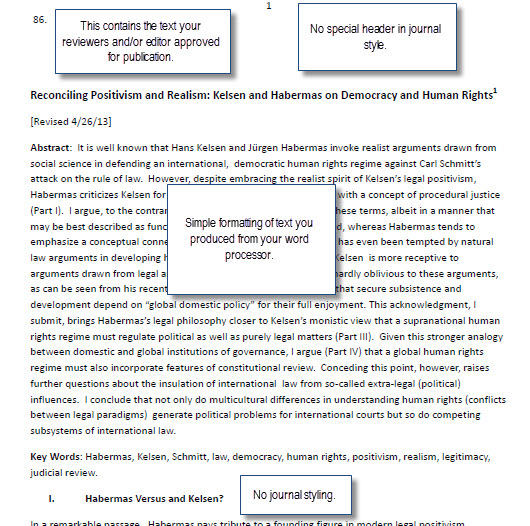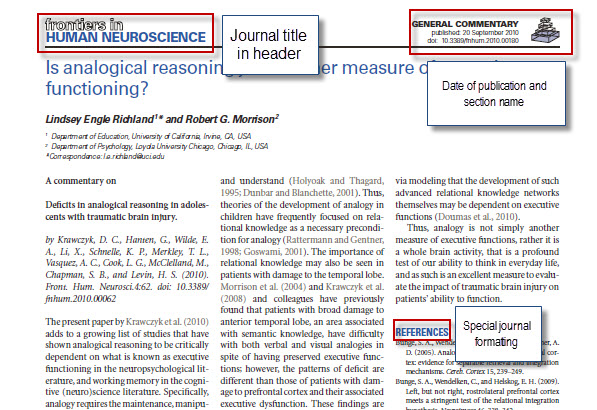Working With Publishers & Open Access
Few publishers allow the published version of articles to be posted online, whether on eCommons, your personal website, or a commercial repository such as a ResearchGate or Academia.edu. If you have posted your final PDFs on such sites in the past, be aware that publishers can and do request that their copyrighted material be removed. Working with eCommons will ensure that you are in line with the agreements you've signed with your publisher.
Almost all publishers allow a version of the work to be posted in an academic repository like eCommons or on an author's own website. Generally we may post the "author's accepted manuscript" or "post print" to eCommons (a manuscript that has been reviewed and edited, but without the publisher's final layout and typesetting).
Here's a guide to figuring out which version you have:
Author's Accepted Manuscript

Publisher's PDF

Which Version Can I Submit?
To determine which version you can submit to eCommons, you can consult the agreement you signed with your publisher, check the publisher's website, or contact the publisher directly. You can also use SHERPA/RoMEO, a searchable database of publisher policies which currently includes information for over 1,000 publishers. Search for the title of the journal you published in to learn what type of archiving is allowed by the publisher's standard author agreement.
Library staff are available to work with you to identify which version of your work can be submitted, and provide assistance negotiating with publishers. Contact us to get started.
Working with Publishers
Publishers are often willing to allow author self-archiving, provided that the published version is properly credited. You can also contact the publisher directly to request permission to deposit the final version of your
work in Loyola eCommons. For your convenience, Loyola eCommons has created a sample letter to a publisher (PDF) that you can use as a template for your correspondence. Just cut-and-paste the sample text into an email or letter, and insert the details for the specific publisher and article.
Library staff can also contact publishers on behalf of faculty. Just send us a message with the details of your publication, and we will work with you to determine the best option for your work.
Modifying the Copyright Terms of Your Publication Contract
Many publishers will consent to changes in the standard author agreement to allow for archiving work in an academic repository such as eCommons. For future publications, consider using the Scholar's Copyright Addendum Engine or the SPARC Author Addendum to modify your agreement with the publisher in such a way that you are able to retain key rights to your work.
What Is Open Access?
"Open access" is a term used to describe information which can be freely accessed by anyone, regardless of institutional affiliation, academic credentials, race, religion, national origin, sexual orientation, age, gender, disability, marital status, or any other classification.
Open access represents the democratization of information as a public good in the service of furthering human progress. The values espoused by the open access philosophy closely mirror Loyola's mission, which speaks to the need for "knowledge in the service of humanity" and "learning and leadership in openhanded and generous ways to ensure freedom of inquiry, the pursuit of truth and care for others."
Loyola eCommons is a tangible expression of these core values, sharing a wealth of scholarly information, research, and creative works produced at Loyola with a global academic audience.
Why Choose Open Access?
Open access has the ability to open up new audiences for scholarly content, especially scholars at smaller institutions, community colleges, or in developing countries, who may have limited or no access to increasingly expensive academic journals and databases.
Open-access dissemination is also required for research that is publicly funded through government agencies such as the National Institute of Health.
Myths About Open Access
A number of myths about open access publishing and author "self-archiving" (posting copies of articles on personal web sites or in an academic archive such as eCommons) continue to pervade academia:
- Open access = losing control of your work
Faculty are often concerned that freely disseminating research online can lead to a loss of control over how their work is used. However, open-access materials have the same copyright protections as those printed on paper; open access only changes the method of distribution, not the author's rights. - Open access = no peer review
Some fear that open access means the erosion of the peer review process. In reality, open access is a fundamentally separate issue from peer-review; it is a decision on how to disseminate information rather than how it should be edited. The Directory of Open-Access Journals lists over 13,000 journals that exercise peer review in one form or another.
Open-Access Publishing
The University Libraries strongly urge faculty to consider publishing in an open-access journal (or choosing an open-access publishing option from a traditional journal publisher) or repository, where all articles are freely available online. Publishing in an open-access context allows you to retain all copyright over your research and make your work available to the widest possible audience. The Directory of Open-Access Journals lists thousands of open-access scholarly journals in a wide variety of disciplines. You can also learn more about programs available through Loyola University Chicago to assist you with open access publishing fees.


